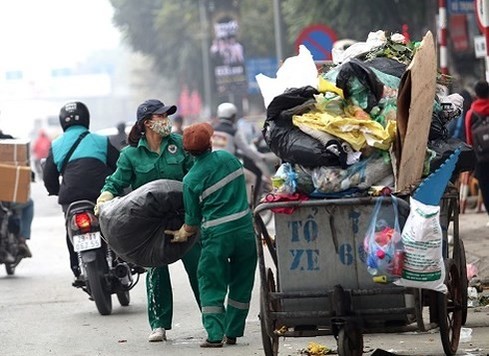 Op-Ed
Op-Ed


|
| Workers collect garbage. People might have to pay more for more waste they dump, according to a proposal in the revised law on environmental protection. — Photo vnnhanh.vn |
Khánh Dương
HÀ NỘI — It's common in Việt Nam to see people throw garbage on a dumping area by the pavement, then collectors come to load the waste into garbage carts and transport to treatment areas.
Monthly garbage collection fee stays the same rate for everyone no matter how much you dump.
In Hà Nội, for example, each household has to pay for garbage collection at a monthly rate of VNĐ22,000 (US$0.9) to VNĐ32,000 ($1.3) on average. The remaining expenses for garbage collection, transportation and treatment are covered by the State.
If the revised law on environmental protection is approved by the National Assembly this year, households would have to pay more if they produce more waste.
The Ministry of Natural Resources and Environment (MONRE) has proposed charging garbage collection and treatment fee based on how much waste they dump, with waste measured by weight or size using custom bags.
The more you throw away, the more you have to pay. It is a reasonable solution to reduce the amount of household waste that increases constantly.
According to MONRE, the amount of solid waste produced in Việt Nam has hit 12.8 million tonnes per year and will continue to rise by 12 per cent every year.
Urban inhabitants discharge 38,000 tonnes of waste per day. The amount of household solid waste in urban areas nationwide is estimated to increase by 10 to 16 per cent every year.
Dr Hoàng Dương Tùng, former deputy head of the Việt Nam Environment Administration, told Vietnam News Agency that the regulation is worth encouraging and has been used in developed countries.
In developed countries, people pay a lot for environmental protection activities and in return, they get a clean environment around them, he said.
I believe that as living standards have improved, many Vietnamese in urban areas are ready to pay more for garbage collection, transportation and treatment as long as their surroundings are kept clean.
Current subsidies on garbage collection, transportation and treatment cost an enormous amount in the State budget.
HCM City, for example, has to spend around VNĐ1 trillion ($43.5 million) on garbage collection and transportation every year and another VNĐ1 trillion to treat it.
Once ‘the more you throw away, the more you pay’ regulation takes effect, the fees collected can be used for garbage transportation, treatment, reducing pressure on local spending.
Minister of Natural Resources and Environment Trần Hồng Hà said in the revised law on environmental protection proposed to the National Assembly that household solid waste is not defined as leftovers but natural resources.
“This is a new definition after a study found 40 per cent of household solid waste consists of food, organic and recyclable elements,” he said.
Based on that concept, the minister proposed charging garbage collection fees based on the weight of waste to encourage people to sort their waste and recycle.
Most Vietnamese households are not used to sorting garbage, even though a large proportion of household solid waste can be recycled.
As they pay a set fee for garbage collection each month, many households leave the work of sorting garbage to waste collectors and treatment units.
If every household sorts its waste, they will share the burden of waste classification and treatment with collectors and environmental companies.
The final target of charging garbage fee based on weight is to raise public awareness.
The proposal is being debated at the ongoing National Assembly meetings and more fees will surely not make everyone happy.
Many are worried some will evade the fees by throwing garbage onto the streets and in lakes and rivers.
Charging garbage collection fees by weight must be integrated into a consistent and comprehensive legal system to ensure there are no loopholes for polluters to flout the law.
For example, polluters couldn't dump waste if penalties for littering in public spaces were stiffened.
Communities and local authorities must strengthen their supervision capacity over illegal littering.
Kim In Wan, former deputy head of the Republic of Korea’s environment ministry, who has studied Vietnamese waste problem for seven years and worked as a consultant for Việt Nam’s revised law on environmental protection, said it would take Việt Nam about five years to effectively implement the new regulation.
There is a long way ahead for lawmakers to discuss the draft, approve it and then years to review its enforcement.
But it is never too late to start sorting our waste problem.
Landfills are already full. Waste dumps have hurt farmers. Lakes, rivers and canals are contaminated. Big cities suffer from heavy floods partly due to trash blocking drainage systems.
You will always pay the price, not just collection fees, for what you throw away. — VNS




